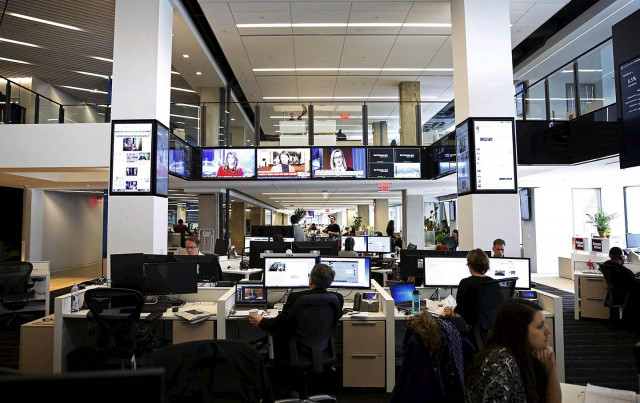A vacuum of information
There must be some code of ethics in place when reporting such events & situation. It is that balance we need to find

Representational image. PHOTO:REUTERS
But can we blame the media, I wonder. By downplaying events, possibly it was trying to lessen the collateral damage. In some ways, one can understand why the media downplayed the events. I recall an incident in Australia in 2014 where there was a hostage taking situation in the central business district of Sydney. In all the coverage of this unfortunate incident at the time the incident was unfolding, what did not come out was the identity of the hostage taker or what demands he had. The media denied what some say is the “oxygen of publicity” to the hostage taker. It is argued that this helped avoid repeat incidents.
In Pakistan itself, we have seen time and again when people resort to acts of violence only to get the media publicity they crave for. In this regard, one recalls the man who held his family hostage in 2013 at Islamabad’s Blue Area and fired in the air. This incident was covered live by most channels. Possibly the media coverage made things worse.
Over the past week, we saw somewhat the same policy used in the Australia hostage situation being followed by the Pakistani media. Most channels downplayed the blockage of roads and the ensuing violence in the hope that such coverage would encourage and embolden those carrying out these acts.
For a media practitioner, this may well be a sensible approach to adopt. But what one can argue is that the world has changed and the appetite for news is such that alternates do not take much time to spring up, which are not always a good thing.
In the old days, when there were a few papers and radio and television were state controlled, anxious people would tune into the BBC or some other trusted radio station to get their news. For some reason, BBC Urdu service – if I am not mistaken- in those days was only broadcast in the evenings. As a result, people were perfectly happy to rely on their limited sources of information in the day and then wait for the evenings for a more accurate overview.
Of course, now the world has changed. Neither do people have that kind of patience, nor is the media that limited. Aside from the numerous news outlets we now endure, there is always the social media to turn to. Much of what transpired on the streets of cities across Pakistan was reported on social media.
While one cannot underplay the importance of social media, the problem here is that there are no checks on what is reported. The onus of verification is left to the audience, which is used to receiving news from the mainstream which usually goes through a series of checks.
Without arguing for restrictions on the social media, one must understand and appreciate that the social media and platforms like WhatsApp are now becoming one of the most popular sources of news and information. We have seen how Twitter was used by the Trump administration to sway voters – rightly or otherwise, as alleged by the media in that country, to vote in its favour.
The challenge for the Pakistani media is manifold. We have seen how journalists have been consistently attacked on the streets by protestors of one party or another because they felt they were not being given proper coverage. The expectations of some is a real problem.
The government must appreciate that it is not in favour of public interest for news channels to impose some sort of blackout. This only pushes the audience to social media where much of the news is not properly verified and, in some cases, can be fake.
But there must be some code of ethics in place when reporting such events and situation. It is that balance we need to find.
Published in The Express Tribune, November 5th, 2018.
Like Opinion & Editorial on Facebook, follow @ETOpEd on Twitter to receive all updates on all our daily pieces.












1724319076-0/Untitled-design-(5)1724319076-0-208x130.webp)


COMMENTS
Comments are moderated and generally will be posted if they are on-topic and not abusive.
For more information, please see our Comments FAQ